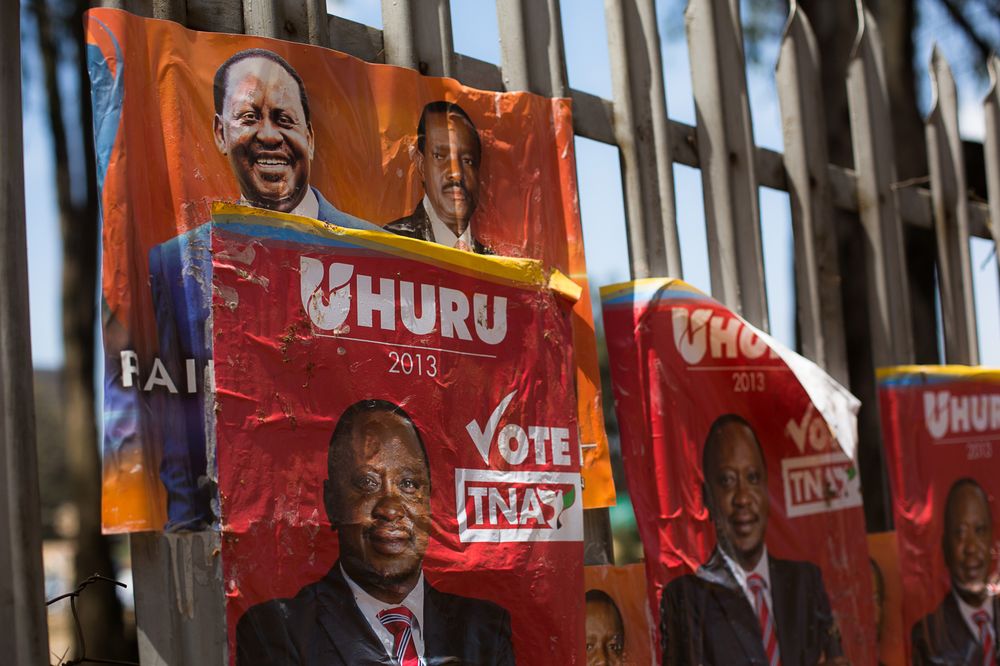
Less than a month before Kenyans are due to go to the polls, electoral authorities are behind on everything from printing ballot papers to finalizing a voter list. That risks a disputed outcome and unrest a decade after post-election violence engulfed the East African nation.
While the Independent Electoral & Boundaries Commission says the vote will take place Aug. 8, there has been a court appeal over the ballot papers and the electronic system to transmit results is still being tested, raising the possibility the election may be delayed or be disrupted. President Uhuru Kenyatta is attempting to secure a second term by seeing off a challenge from former Prime Minister Raila Odinga, who’s warned of possible violence if the vote is seen as rigged.
The electoral body is “blind to the grave consequences of not getting it right this time,” said Ndung’u Wainaina, executive director of the International Center for Policy and Conflict in the capital, Nairobi. “The IEBC has become the biggest danger to the stability of this country. Kenyans should start preparing themselves for any eventuality.”
The credibility of the past two elections in East Africa’s biggest economy have been questioned by the opposition. A dispute over the outcome of the December 2007 vote triggered two months of ethnic violence that left at least 1,100 people dead and caused economic growth to slow to 1.7 percent in 2008 from 7.1 percent a year earlier. Recent opinion polls show neither Kenyatta nor Odinga are likely to win at least 50 percent of the ballots cast, raising the prospect of a runoff vote.
‘Massive Irregularities’
The National Super Alliance, a coalition of five parties that backs Odinga, on Monday demanded the electoral agency clean up the voters’ roll and open it to public scrutiny, describing a register on the IEBC’s website as containing “massive irregularities,” including more than 400,000 double registrations. Roselyn Akombe, an IEBC commissioner, said the register had been available for a month and the issue should have been raised before. A biometric system to verify voters means there will be no duplicate ballots, she said.
Last week, the High Court ruled in favor of an opposition application to cancel a contract awarded to Dubai-based Al Ghurair Printing & Publishing Ltd. to print presidential ballot papers. The IEBC, which signed the contract last month even after a court ruled in February that a previous award to the company was illegal, appealed the ruling on Monday.
“The buck stops with the IEBC to convince Kenyans that they are prepared to hold credible elections,” Dismas Mokua, a political analyst at Trintari, a Kenyan risk advisory company, said by phone. “They keep appealing this case, creating a perception that they are favoring one side.”
While the electoral body is ready to hold the vote, it’s still working to “protect vulnerabilities” in its electronic system that will transmit results from polling stations to local constituency counting centers and then to the main center in Nairobi, Akombe said by phone. It will conduct more tests starting on July 21, she said.
System Vulnerable
The system could be subject to interference because it runs over a network the IEBC doesn’t control, Akombe said. “There is a vulnerability we are trying to protect, but there is nowhere in the world where this system is foolproof.”
If the electronic systems fails, the IEBC will be forced to revert to manual transmission, which is “not our ideal situation, but is provided for in the law,” she said.
The IEBC resorted to a manual system to verify voters’ identities in 2013 after biometric machinery failed, a move the opposition cited as evidence for their claim of vote-rigging.
While laws enacted in 2016 would make vote-rigging more complicated, “extensive electoral irregularities cannot be ruled out,” according to Robert Besseling, director at Johannesburg-based risk analysts Exx Africa.
“The election result could still be manipulated at the polling station and at constituency level,” he said in an emailed note.
The electoral body’s lack of preparedness gives the opposition ammunition to contest results if it loses, while the ruling Jubilee party may also reject the outcome given its accusations that recent court rulings are aiding the opposition, said Ahmed Salim, Dubai-based vice president at Teneo Strategy.
“Tension between the opposition and the IEBC, the executive and judiciary doesn’t bode well for the outcome,” Salim said by phone. “It’s definite that the outcome will be challenged by both Jubilee and the opposition coalition.”

